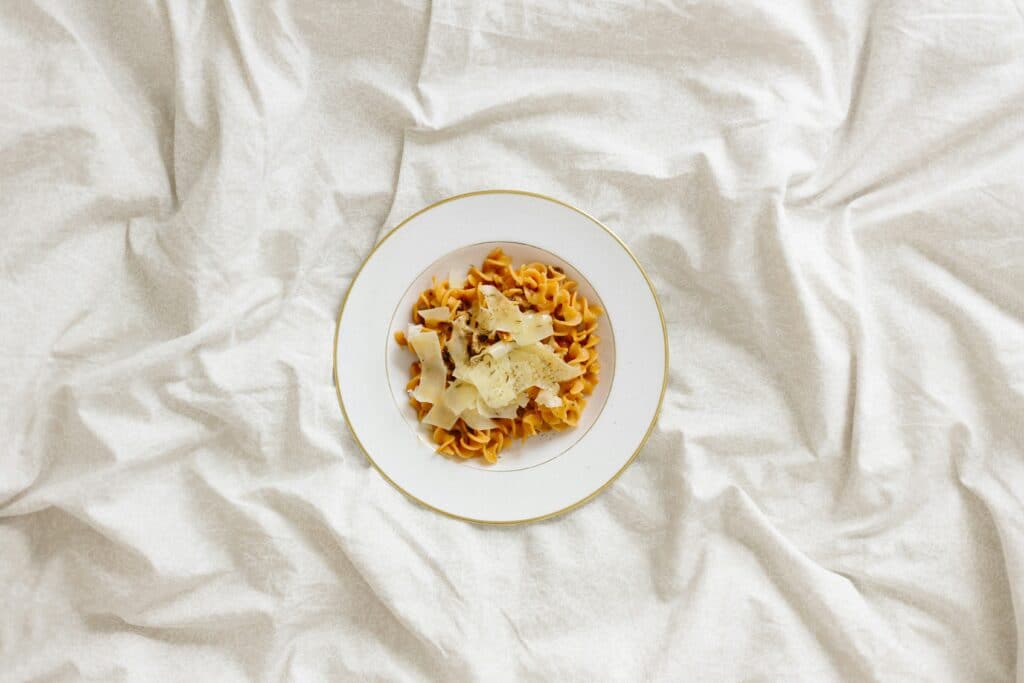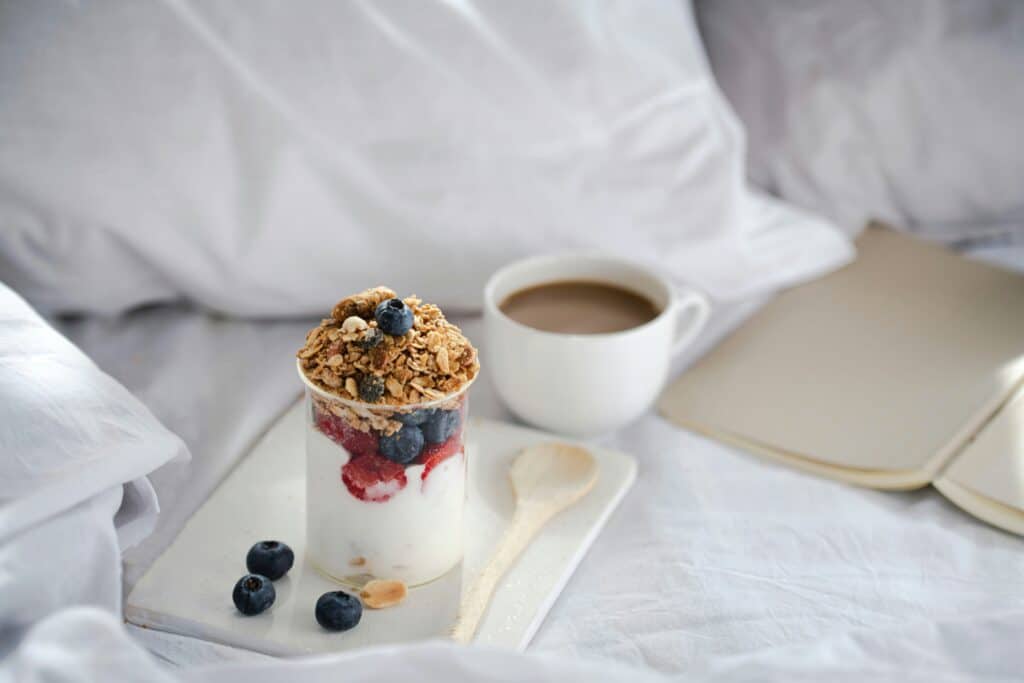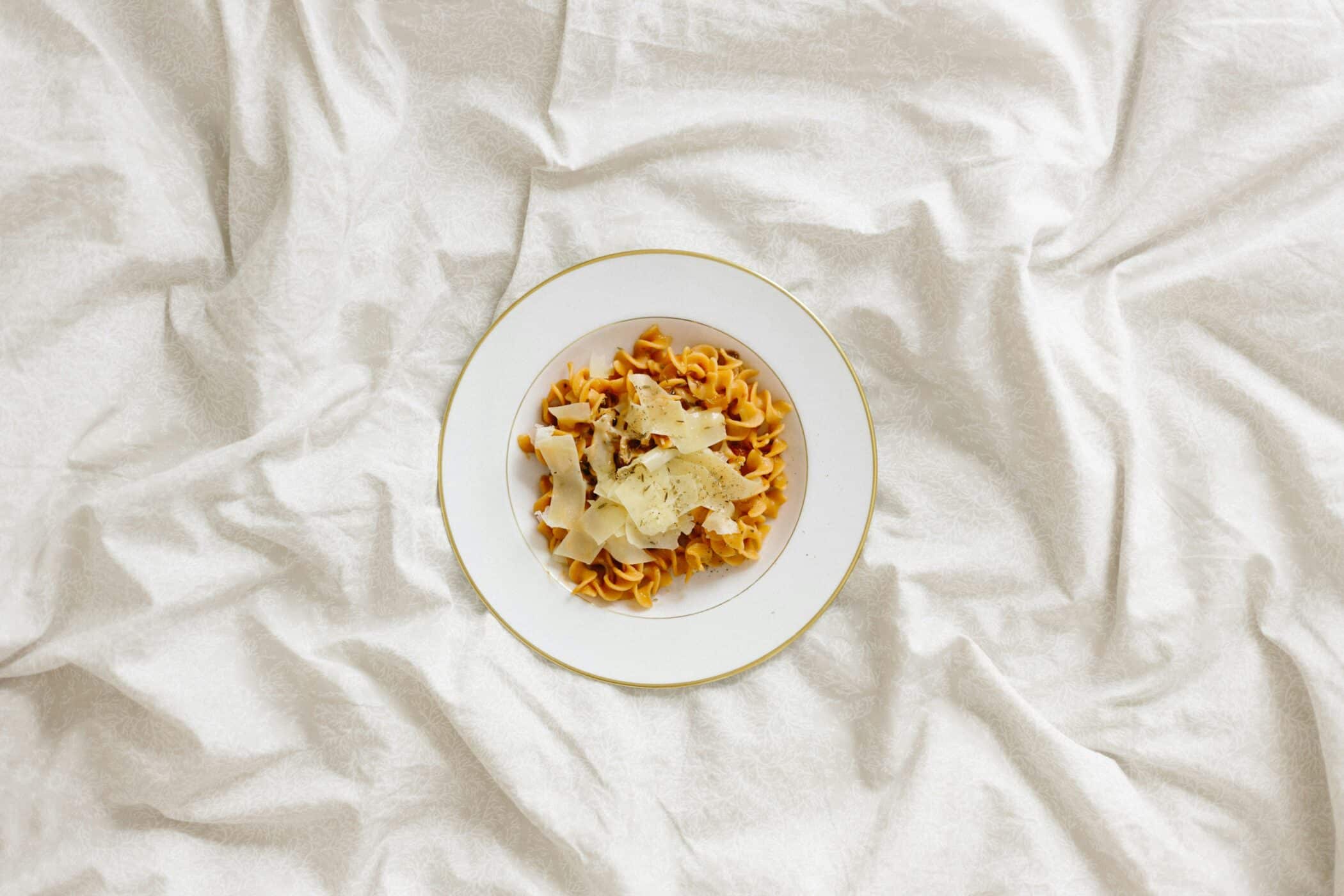
A good night’s sleep is one of the key steps toward our well-being. Unfortunately, many people struggle with sleep disorders and poor sleeping habits, which can cause various complications along the way. In attempts to inspire sleep and get rejuvenated, many forget about one crucial part that may be disrupting their rest – dieting. Sleep and dieting have an interesting connection, and you can get the proper shuteye you deserve by understanding it.
Table of Contents
Does diet affect sleep quality?
Yes, diet plays a crucial role in determining sleep quality. A diet rich in essential nutrients will regulate your sleep-wake cycles. Additionally, foods with certain ingredients (like melatonin and tryptophan) help you relax and fall asleep more easily. On the other hand, consuming caffeine or heavy meals close to bedtime can decrease your sleep quality.
Sleep and diet have an interesting relationship, as they are two massive parts contributing to our quality of life. On top of that, one affects the other, making them intertwined. You’ll notice improved bodily functions when your body gets the necessary vitamins, minerals, proteins, and carbs. Of course, sleep is one of them.
A few ingredients in particular can ensure you’ll inspire sleep in a matter of minutes. For example, magnesium regulates neurotransmitters associated with sleep. Foods like nuts and leafy greens are excellent sources of this mineral.
Vitamin B6 can also be a valuable addition to your attempts to inspire sleep as it boosts melatonin production. And as melatonin is the vital hormone for inducing sleep, having foods like bananas or poultry close to bedtime can make it much easier to dive into bed.
As certain foods can promote certain chemical changes in the body that inspire sleep, here are a few examples of what you can include to make slumber a lot easier.
Melatonin-rich foods:
- cherries;
- grapes;
- tomatoes.
Tryptophan sources:
- turkey;
- chicken;
- nuts ;
- almonds,
- walnuts
- seeds ;
- sunflower seeds,
- pumpkin seeds.
Magnesium-rich foods:
- almonds;
- spinach;
- avocado.
Foods to avoid before bedtime
Just like certain foods can inspire sleep, others can disrupt your sleep cycles or make it harder to fall asleep.
Stimulants and caffeine:
Minimize stimulants and caffeine-containing beverages close to bedtime for a good night’s sleep. Although a cup of coffee may sound calming and relaxing, it stimulates the nervous system, thus making it harder to enter the deep sleep phase.
You may not directly feel its effects, but caffeine can stay in your body for hours, disrupting your sleep cycles. It would be best to avoid caffeinated beverages at least six hours before sleep, and substitute it with a healthy drink shot. The same goes for tea and energy drinks, which can also interfere with the natural progression into restful sleep.
Lighter meals you can easily digest are much better in the evening. Rich, heavy meals can make you feel discomfort, thus making it harder to get a good night’s sleep. Additionally, spicy foods can cause heartburn and indigestion, which can also disrupt your sleep cycle. Foods high in fat and grease are harder to digest, so no matter how tempting they are, it would be best to avoid them close to slumber time.
Healthy eating habits to inspire sleep

In addition to choosing the right ingredients, healthy eating habits are another thing you can optimize to ensure your body goes through all sleeping cycles to make you wake up feeling rested and refreshed. Here are a few simple changes you can make to get those results.
Meal timing
The timing of your meals will make a giant impact on the body’s circadian rhythm and sleep-wake cycle. This is what you do to harmonize these cycles.
Early dinner
Having a meal earlier in the evening will allow your body to digest it before bedtime properly. As we mentioned, a heavy dinner can disrupt your sleep. Hence, if you have no option but to eat something heavy, try doing it a couple of hours before going to bed.
Light Snacks:
If you find yourself hungry before bed, grab a light, easily digestible snack. By doing so, you’ll satisfy your hunger without causing any discomfort and disruptions to your sleep.
Avoiding late-night eating:
Late-night snacking or heavy meals close to bedtime can increase stomach acid levels. That can cause heartburn and make it harder to inspire sleep.
Combining these tips, you can make a routine with well-balanced dinners and mindful snacks for better digestion and sleep quality.
Convenience of meal delivery services
It’s very common for people to have a hard time balancing their work and private life with healthy eating habits. A meal delivery service can be a true lifesaver if you have similar challenges. With a meal plan for maintaining a healthy weight, you can get pre-prepared meals delivered to your front door with ideal nutritional balance. With that, you can save time while ensuring all your meals and macros are on point. Furthermore, having those balanced options will ensure your healthy sleep cycles remain intact.
Hydration and sleep
It’s well-known that hydration is one of the key aspects of a healthy body, but did you know that hydration can also affect your sleep?
The main thing to implement is consistency in your hydration. When you consume it throughout the day, you will support all your bodily functions without the need for excessive nighttime bathroom visits.
That’s why you should try reducing your fluid intake an hour or two before bedtime – it minimizes the likelihood of waking up during the night to use the bathroom.
Final thoughts
Making healthier eating choices can inspire sleep and improve the quality of your entire essence. However, you must remember that there are multiple changes to get a good night’s sleep.
Luckily, changes like the timing of your meals and avoiding certain foods and drinks are minor and can be implemented easily. By aligning your eating habits with the body’s natural rhythms, you create a supportive environment for restful nights. Sweet dreams await those who prioritize a balanced and nourishing lifestyle.

